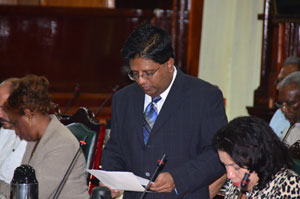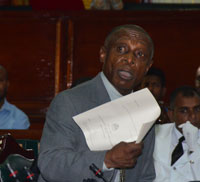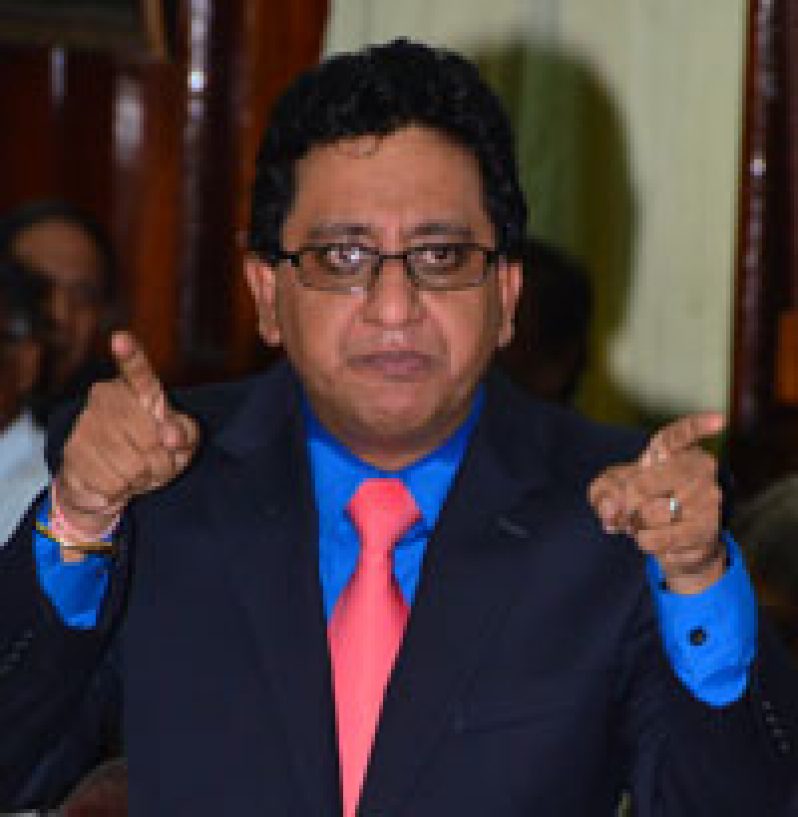A DEBATE that commenced on Valentine’s Day last was completed last evening with the combined opposition voting in favour of restructuring the way the National Budget is prepared, particularly as it relates to certain constitutional offices, much to the dismay of government that condemned the proposal as “flawed.”
 The Opposition, while conceding limitations in the proposal, voted in favour of A Partnership for National Unity (APNU)’s Carl Greenidge’s amendment of the Fiscal Management and Accountability Act.
The Opposition, while conceding limitations in the proposal, voted in favour of A Partnership for National Unity (APNU)’s Carl Greenidge’s amendment of the Fiscal Management and Accountability Act.
Attorney General and Minister of Legal Affairs, Anil Nandlall, roundly rejected the proposal by Greenidge as the height of mediocrity, an abuse of Parliament and a waste of taxpayers’ money.
“He is dealing with matters way beyond his scope,” accused the Legal Affairs Minister, asking “how else can one explain this travesty?”
The debate resumed yesterday in the House with Junior Finance Minister Bishop Juan Edghill reiterating that while the administration is in full support of constitutional offices being independent in their functioning, there has to be a balance given that there is still need for accountability.
“Independence cannot be absolute,” argued Bishop Edghill.
He accused the Opposition of looking to usurp the powers of the Executive and looking to establish a tripartite budget preparation process with three separate budget presentations each year.
According to the Junior Finance Minister, with the architecture proposed by Greenidge the Public Accounts Committee chaired by Greenidge will submit one budget to the office while another is prepared and submitted to the Clerk of the National Assembly, who would in turn submit this budget to the House for another agency, while the Finance Minister will be responsible for presenting yet another budget.
He said that this position will beg the question as to who will be accountable for the agencies in which the Finance Ministry had no input.
The Junior Finance Minister espoused that while Greenidge’s intention may be laudable, the mechanism through which  he was looking to achieve the goal was flawed.
he was looking to achieve the goal was flawed.
Alliance For Change (AFC) Chairman, Khemraj Ramjattan, in his support of the Opposition bill, conceded deficiencies, and said these could be worked out at a later date.
Ramjattan argued that the amendments were looking to give effect to the Constitutional reforms of 2001, whereby several constitutional offices had been identified to receive their annual allocations in a lump sum.
He argued that regardless of whether the format was not perfect, this could be sorted out through trial and error, a position that AG Nandlall utterly rejected.
Nandlall suggested that it is not because the bill by Greenidge did not benefit from the expertise of draftsmen that the House should have to be subjected to mediocrity.
Ramjattan had suggested that “If we have political will to want more accountability, we would support this bill…there may be imperfections about it but it’s a start.”
Nandlall, detailing what he called the inherent flaws, said that the legislation being proposed by Greenidge firstly has nothing to do with the law which he was looking to amend.
According to Nandlall, Greenidge was looking to have lump sums approved for agencies that he had already sought to remove from the purview of the Fiscal Management and Accountability Act.
The Act he said, has a specific schedule of budget agencies for which its financial administration is dealt with, but he reminded that the agencies that the APNU member was looking to affect, he already sought to remove from under the FMA.
The attorney general argued that in the context, the House should not have even been considering the proposal by Greenidge.
In his presentation also, the minister sought to point out to the House that the Executive, should the Bill be assented, cannot be held accountable for something over which it had no power.
“An absurdity of extraordinary proportions,” chided Nandlall, as he again argued that the opposition was looking to tamper with the separation of powers between the Executive and the Legislature.
He said that while Government espouses the ideals of transparency, there must be the appropriate mechanisms to achieve the objectives.
“We can’t waste Parliament’s time and taxpayers money with mediocrity.”
Substantive Finance Minister Dr Ashni Singh, who also weighed in on the proposal by Greenidge, urged that it be withdrawn.
Outside of what he called the obvious inconsistencies with the Constitution, is the fact that Greenidge was looking to alter the role and responsibility of the various branches of government.
The finance minister is adamant that the matter before the House was not trivial in nature, as it goes to the core of the nation’s financial architecture.
He explained that traditionally, Guyana’s system of government has assigned to the Executive, the responsibility for managing the economy, expenditures and the consequences of the non-achievement of fiscal projections.
As such, the minister questioned how government could be held accountable for public sector funding, when sections of the expenditure would have been removed from its purview.
He argued that financing of the various agencies could influence the overall deficit in relation to the Consolidated Fund.
According to Dr Singh, with the removal of the budget agencies from under the Fiscal Management and Accountability Act, “who do you hold responsible for the non-attainment of fiscal outcomes.”
He said that for Greenidge’s proposal to be approved, it would mean that the Executive will find itself in a position of playing no role in the budget agencies that would call on the treasury.














